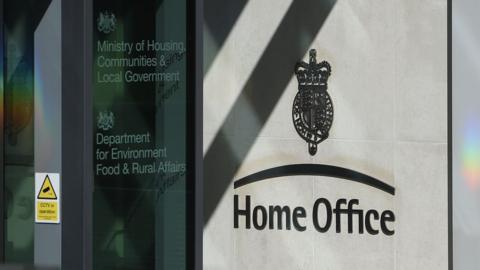Official government data released last week showed a record 123,100 households were in temporary accommodation at the end of June, a 16% rise on last year.
Research published last month by the No Accommodation Network, an umbrella group for organisations in the asylum sector, suggested a big rise in refugee homelessness over the last year.
They said 1,941 adults granted leave to remain had found themselves without accommodation in 2023/24 - a rise from 977 in 2022/23.
The organisation called on the government to do more to combat the "refugee homelessness emergency".
The government's Homelessness Reduction Act, which was implemented in 2018, acknowledged that at least 56 days are usually needed to find accommodation.
Currently, a refugee granted leave to remain is given up to 28 days to find somewhere to live before they are evicted from Home Office accommodation.
If a newly-recognised refugee does not find somewhere to live in that time, they often declare themselves as homeless to a local authority.
A lack of available accommodation options has meant many councils and charities have had to use more expensive options, such as hotels and bed and breakfasts, to house those in need.
The boss of a homelessness charity in Manchester told Radio 4's Today programme this week it had seen a huge increase in the number of asylum seekers or refugees -from 30% to more than 60% of the charity's caseload in the last 12 months. She did not say how many people this equated to.
Jo Walby, chief executive of Mustard Tree, said refugees often struggle to "access the private rented market" in big cities like Manchester.
She added: "The reality is, you can't learn English, you can't work, and then you have four weeks to be told to find a job and find a house and you don't have access to government support or council support, because you don't have priority need."
Matt Downie, head of the homelessness charity Crisis, said: "This extension will ensure that people trying to rebuild their lives after fleeing war and persecution won't face further trauma of life on the streets.
"This is a hugely positive step... it's important that this becomes a permanent change next year if we're going to ensure that refugees granted settled status don't face homelessness in the future."
Phil Kerry, the chief executive of New Horizons Youth Centre, a London-based charity that helps young homeless people, said: "The timing of this news could not be better and crucially means that we won't have more refugees pushed onto the streets this Christmas."
A Home Office spokesperson said: "We have inherited enormous pressures in the asylum system and remain absolutely committed to ending the use of hotels as we ramp up returns of failed asylum seekers."
